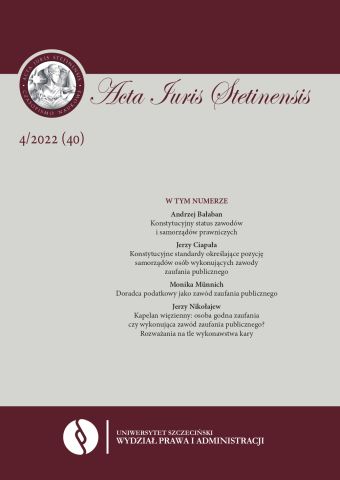Oznaczenie inkasenta poprzez cechy indywidualne – glosa do wyroku Wojewódzkiego Sądu Administracyjnego w Gdańsku z dnia 14 października 2020 roku, sygn. akt I SA/Gd 744/20
Designation of a tax collector by individual characteristics - commentary to the judgment of the Provincial Administrative Court in Gdańsk of 14 October 2020, I SA/Gd 744/20
Author(s): Wiktor Gnych-Pietrzak, Bartosz NamiecińskiSubject(s): Law, Constitution, Jurisprudence, Sociology of Law, Administrative Law
Published by: Wydawnictwo Naukowe Uniwersytetu Szczecińskiego
Summary/Abstract: The aim of this critical commentary is to present the issues related to the method of establishing the position of debt collectors and their remuneration for collecting levies. The main research objective of this paper is to assess the current legal regulations related to the definition of a debt collector based on the decision of the Provincial Administrative Court. The second (supplementary) research objective addresses the issue of remuneration and the requirement of payment of this remuneration to the collector. This study takes a critical look at the Court’s arguments regarding the requirement to identify the debt collector individually through personal data, while the relationship between the determination of remuneration and its actual payment was endorsed. The paper uses primarily the case study method, supplemented by an analysis of the law in force. The analysis looked at the current Polish legislation in the legal and tax angle that refers to debt collectors and at how it is determined. Moreover, the analysis also accommodated decisions of Polish courts. The research shows, that there is no consensus in the administrative judiciary on the problem of defining a debt collector, especially on how it should be done - by what qualities it should be defined. It was noted that there are two main lines of jurisprudence in this regard. The first one negates the need to specify the debt collector (natural person) by name - i.e. by using personal data. We must note that when it comes to defining a debt collector we must create such a construct, which will define this entity precisely enough. However, this does not mean that the debt collector must not be defined using generic features. The second line of jurisprudence suggests that the identification of a tax collector (natural person) should involve naming their personal data, in particular their first and last name. Only by doing so may a taxpayer verify whether a given entity is a tax collector authorised to collect taxes. The discussed ruling is part of the second line of jurisprudence. In the author’s opinion the presented problem should be looked at from the perspective of the principles of legal interpretation as the basis for the reasoning carried out in order to decode the legal norm contained in the legal text.
Journal: Acta Iuris Stetinensis
- Issue Year: 2022
- Issue No: 40 (4)
- Page Range: 213-222
- Page Count: 10
- Language: Polish

